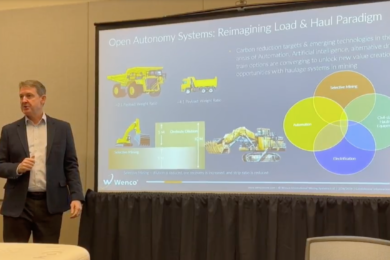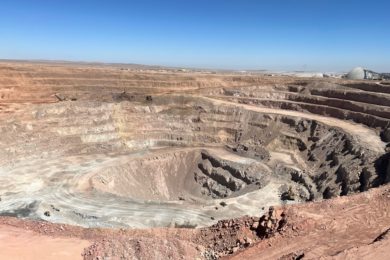Sul Americana de Metais (SAM) and Huawei, a global leader in Information and Communication Technology (ICT) solutions, signed on July 8, a memorandum for the development of unmanned mining technology and effective application of 5G in the operation of the Block 8 Project, which provides for the extraction and processing of iron ore in northern Minas Gerais, Brazil. The document also provides for social responsibility actions in the region. Block 8 will produce 27.5 Mt/y (dry basis) of 66.2% Fe iron ore pellets.
SAM is owned by Chinese company Honbridge Holdings. Block 8 had its origin in the former Vale do Rio Pardo Project, which consisted of a mining area and an ore treatment plant located in the northern region of Minas Gerais. A pipeline of about 482 km was also planned, which was destined for Porto Sul, developed by the government of Bahia, in Ilhéus. In the second half of 2017, Honbridge Holdings’ shareholders decided to restructure SAM’s business model. The project, now called the Block 8 Project, underwent important optimisations SAM says to promote the reduction of environmental impacts and the increase of its operational safety. In addition, it now comprises a future dam on the Vacaria River that will provide water for its operations and for the region. The distribution of water to the communities will be the responsibility of the government of the State of Minas. The ore logistics will be carried out by an independent company. The Block 8 project is still under development. Engineering studies are being carried out, as well as the studies necessary for its environmental licensing.
According to Jin Yongshi, CEO of SAM, the company has directed all its efforts to create an extremely safe mining project and one of the possible solutions is unmanned mining by implementing an autonomous or remotely operated mine. “Today there are already trucks and autonomous drilling machines and some other equipment necessary for the mining operation can be controlled remotely. However, we will need to integrate huge autonomous trucks and remote control equipment into a network system. It will be necessary for huge machines to communicate with the command centre, efficiently with low latency and operate safely in a single pit. Compared to the 4G network, 5G has the advantage of much higher speed and bandwidth and much lower latency (data slowness). This type of fast, reliable and real-time network can break the bottleneck of today’s autonomous operations.” The company has stated it intends to use unmanned trucks, drill rigs and excavators.
Yongshi points out that Huawei and SAM will combine their technological capabilities to promote innovation and comprehensive development in the mining industry in Brazil, for a new way of intelligent mining. “This initiative seals our cooperation and optimises the operation of the Block 8 Project, promoting access to the advantages of 5G technology with high bandwidth and low latency, improving the accuracy and stability of unmanned control of mining equipment and the application 5G in large scale mining.”
For Sun Baocheng, CEO of Huawei Brazil, 5G empowers mineral production, keeps the workforce safe and improves people’s quality of life. According to him, he has been cooperating with Brazilian telecommunications companies for more than 20 years, without any security problems. “We will include operators in the negotiations, in order to contribute to the improvement of technology and to provide better quality telecommunications services to local communities, using Information and Communication Technologies solutions.”
In addition, to create more social benefits for the Block 8 region, the two companies will train workers at a technical level in 5G, AI and Cloud solutions, creating more opportunities for people in the region to learn and access high technology. “We are going to promote educational cooperation with local universities and schools and, when the Block 8 project comes into operation, we will implement a Technological Innovation Centre in the north of Minas Gerais,” concludes Yongshi.










